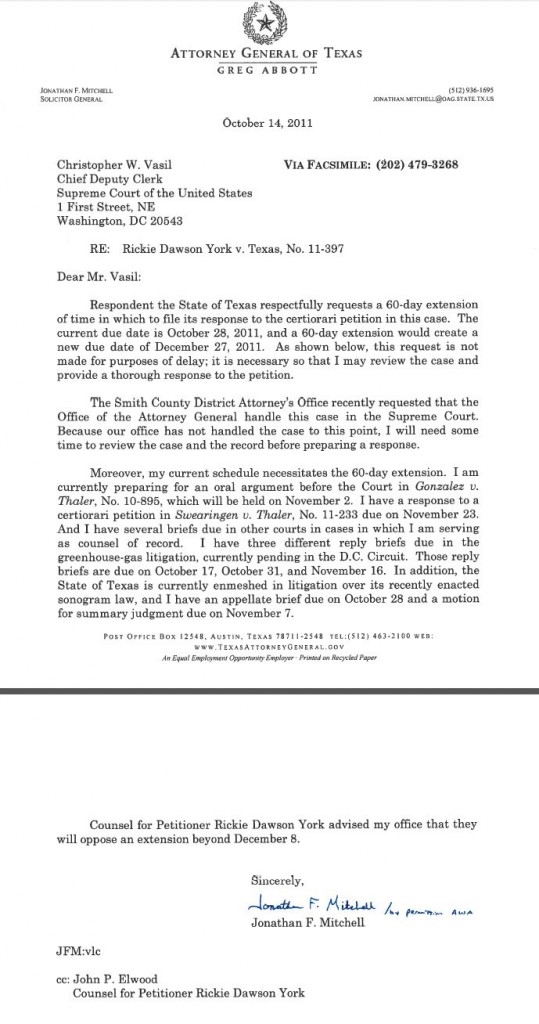One of the key questions concerning the timing of the government’s imminent cert petition in Texas v. United States is whether Texas will seek, and receive, an extension on the Brief in Opposition. To recap, the Brief in Opposition is due 30 days after the case is docketed. Under the Court’s rules, the respondent can waive a BIO–and if the Court is interested, they can request one. I can’t see Texas waiving a BIO here. More likely, Texas will seek a 30-day extension to file. If such an extension is granted, the BIO would not be due until (approximately) January 20. This later due-date will put it up for conference in February, and almost certainly too late for oral argument this term. (Unless the Court super-exedites the case–unlikely for prudential reasons because an intervening presidential election may very well moot the entire case). Instead, the case would be kicked till next term.
So will the Court grant an extension? We did some homework. Cato (on whose behalf I wrote an amicus brief in this case) Research Assistant, Anthony Gruzdis, reviewed over 700 dockets where an extension was filed for a BIO. Anthony couldn’t find a single instance where the 30-day extension was denied. This is not to say it doesn’t happen, but we weren’t able to find one. If anyone else has examples, please send them to me.
Under the normal course of procedure, Texas would get the extension as a matter of course from the Clerk (Update: not the Circuit Justice). Usually, these sorts of motions are not referred to the full Court.
A possible curve ball is if the Solicitor General pre-emptively opposes an extension on the BIO. The SG could request that the Clerk refer the motion to the entire Court–effectively insinuating that the extension was a dilatory tactic. If this sounds familiar, it ought to–just last year, Mike Carvin made similar arguments concerning the Solicitor General’s motion for an extension on the BIO in King v. Burwell. Recall that a cert petition in King and a petition for rehearing en banc in Halbig were pending simultaneously. Mike Carvin, representing both King and Halbig, asked the Clerk to refer any motion for an extension to the entire Court.
Pursuant to Rule 30.4 of this Court’s Rules, I request that any application by Respondents for an extension of that time be submitted to the full Court for consideration. For reasons explained in the Petition, this case involves a matter of urgent public importance and petitioners therefore oppose any attempt to delay its resolution.
Ultimately, the SG was given an extension, the D.C. Circuit granted en banc, then the Supreme Court granted certiorari, and the rest is history. But it is ironic if now, SG Verrilli would be on the other end of the dilatory-tactic charge, and pre-emptively oppose the extension for the BIO. Certain institutional interests would suggest that the SG should not be making this sort of an argument, but as usual, Obamacare is different.
No doubt this is something the SG’s office has already discussed, and decided on.
Update: John Elwood tweets a story about York v. Texas (11-397). The petition for certiorari was filed on 9/26/11, and the BIO was scheduled to be due on 10/28/11. Texas requested an additional 60 days to file the BIO, which would have made it due on 12/26/11–after the sweet spot of December 20 (that we have discuss a lot). Elwood said that he only approved a 42-day extension, which would have made the BIO due on 12/8/11. The clerk told Elwood that without consent, it would go to Circuit Justice Scalia–Elwood was told that Scalia would deny the extension without consent. Texas agreed to 42 days, and the BIO was filed on December 8, the reply brief was filed on December 20, and it was distributed for the January 13 conference, but ultimately denied. The lesson from Elwood’s story is that a motion for an extension without consent would be denied. Although, the incident from Mike Carvin and King v. Burwell suggests that this rule is flexible.
